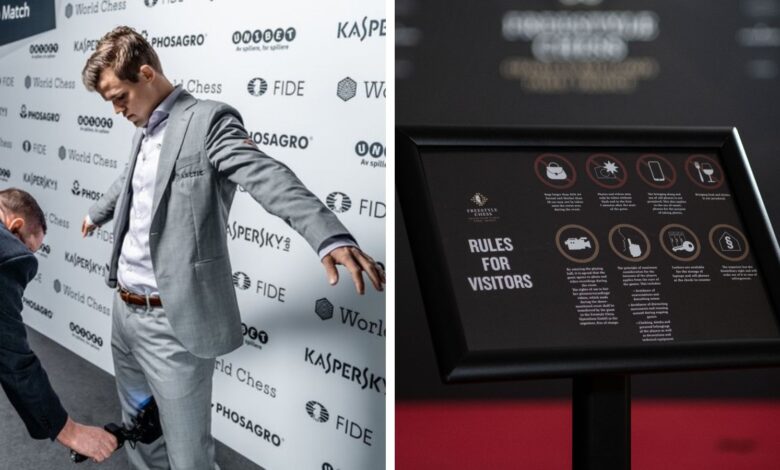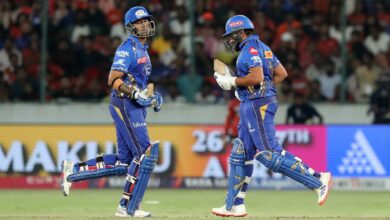‘Close to CIA-level surveillance’ to curb chess cheating says Paris freestyle arbiter | Chess News

When Ukrainian Grandmaster representing Romania, Kirill Shevchenko was expelled from the Spanish team championship in October 2024 over accusations of using a phone to cheat, it not only sent shockwaves through the chess community but also shattered the illusion held many that over-the-board cheating was a thing of the past. Months later, two key developments — Hans Niemann’s sudden withdrawal from the Paris Freestyle Grand Slam Tour and Shevchenko’s confession, which led to a three-year worldwide ban from FIDE’s Ethics and Disciplinary Committee — only intensified the discussion around the persent issue of cheating in chess.Shevchenko, ranked World No. 69 at the time of his offence, became one of the highest-profile players to be implicated in such misconduct in chess.
Shevchenko admitted to concealing a phone in the bathroom during play, while Norwegian media outlet TV2 suggested Niemann’s last-minute exit was an attempt to avoid the event with stringent anti-cheating measures.
Story continues below this ad
Despite Freestyle CEO and chief organiser Jan Henric Buettner dismissing speculation that new anti-cheating protocols prompted Niemann’s withdrawal, questions remain as to why the American grandmaster pulled out less than 48 hours before the tournament.
“I don’t want to speculate because I spoke to Hans a lot about security when we finalised his participation,” Buettner stated. “I told him that maximum security was in his own interest, especially since one of his goals was to clear his name and let his chess speak for itself.”
The freestyle security crackdown
While FIDE typically relies on Professor Kenneth W. Regan, a renowned statician and anti-cheating expert to analyse game accuracy using his specialised methods, the Freestyle tour takes a different approach. Since freestyle chess introduces unique gameplay dynamics, Regan’s system isn’t directly applicable. Instead, the organisers have implemented different security measures to ensure fair play.
“We have a strict control system. Players pass through airport-style metal scanners at the entrance — no electronic devices are allowed inside. Once cleared, they’re manually tracked fair play officers. Inside the hall, we use signal detectors to monitor any suspicious activity. With a prize pool exceeding $680,000, we can’t afford lapses in security.” Gerhard Bertagnolli, Chief Arbiter at the Paris Freestyle Tour explains to The Indian Express.Story continues below this ad
Gerhard Bertagnolli, Chief Arbiter at the Paris Freestyle Tour. (Stev Bonhage)
When asked about the possibility of cheating slipping through, Bertagnolli acknowledged the challenges but emphasised their high standards, “We can never guarantee 100% detection, but we’re doing everything possible. We may not be at CIA-level surveillance, but we’re certainly close!” he says.
Is chess more honest than other sports?
Cheating scandals in chess often make waves, but is the game completely vulnerable to dishonesty compared to other sports? Peter Doggers, a former Dutch chess player who now works for Chess.com, argues that chess may actually have fewer systemic issues than other competitive fields.
“Over-the-board cheating is less prevalent than people think. We might sometimes even overestimate the problem,” Doggers tells The Indian Express. “Look at cycling or athletics, where multiple top athletes have been exposed were using doping/performance enhancers,” he adds.
“In chess, we never had that the absolute best players in the world, none of them really ever got caught and likely never really did anything or maybe they tried a little bit, but it must have been very rare. We only have the allegations, to be honest. The strongest player caught cheating was I don’t think even in the top 50 in the world when that happened. So, in that sense, we are maybe doing even better than some other sports,” says Doggers. Story continues below this ad
His perspective contrasts with that of five-time world champion Viswanathan Anand, who sees cheating in chess as an “arms race” — an ever-escalating battle that can never be fully stopped.
Doggers, however, believe most cases are isolated incidents, citing research showing that players caught cheating online rarely repeat the offence. “I don’t believe one can really say that players who want to cheat will always cheat. Various research suggests that most who are caught don’t try again, especially if they face consequences,” he says.
“But with new generations of players coming up, there will always be new players joining the pool who want or are going to try to cheat. And they will also have more modern ways of doing it. I mean every couple of months there will be a new Chrome extension in the browser which is simply created only for cheating and it’s very difficult to fight it,” he adds.
World No. 1 Magnus Carlsen, on the other hand, painted a durbing picture of how minimal assance could create maximum impact in high-level play. “If I started cheating, you would never know,” Carlsen stated bluntly in a podcast. “I would just get a move here and there (from an aide). Or maybe if I am playing in a tournament I just find a system where I get somebody to signal to me when there’s a critical moment: a certain moment where a certain move is much better than the others. That’s really all I would need to go from being the best to being practically unbeatable. There’s so little you need in chess (to cheat). It really is a scary situation.”Story continues below this ad
Unlike obvious cheating methods, Carlsen described nearly imperceptible interventions that would be virtually impossible to prove. He drew parallels to horical cheating methods, referencing the 2010 scandal where the French national team captain allegedly guided his teammate just standing in certain spots around the table to tell him where to move.
Online cheating dilemma
When it comes to online play, the issue becomes even murkier. Former world champion Vladimir Kramnik has argued that platforms like Chess.com should ban players if they are “90% certain” of cheating. But Doggers warns against such an approach.
“When you are running an organisation like Chess.com where you have a legal department, you cannot go for 90% because it will mean that every 10 players you’re banning also include one [innocent] player,” he explains. “And it does not work that way. Before we can actually ban someone, which has effects because people will find out and it might be spread on the internet and people’s careers and reputations are damaged. So you need to be 99.99999% certain before you can ban someone from a platform,” adds Doggers.
While the persing issue of cheating and the whole fight against it evolves, the thing which remains clear is the debate over fairness in this sport is far from over, and as things appear, the solutions are anything but simple.





